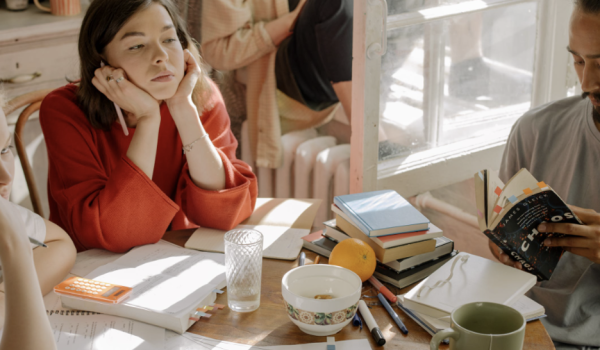From vegetarians, to burger lovers, many youth around the globe are becoming more and more conscientious about the foods they put into their bodies. Here are stories of three students who were strong enough to change their habits and practice completely new eating behaviors.
A current trend in the past 10 years has seen many different types of organic and BIO foods, along with vegetarian and vegan substitutes as alternatives to meat. With a new, heightened sense of awareness, the generation of today has a much broader view about what they’re putting on their plates: from what it is, to where it came from and how it was prepared. So how and why are people deciding to adapt a more healthy and conscientious lifestyle when it comes to their eating habits?
Laura, a 25 year old from Northern California, USA who runs a popular animal-friendly homesteading site, explains a bit about her decision to go vegetarian (and eventually vegan): “I was 18 at the time, so I was beginning to make my own dietary choices. When I was younger, I just sort of went along with whatever my parents gave me. Once I graduated high school though, things started to change for me. My boyfriend and I decided to have a contest to see who could go the longest without eating any meat. I still find it kind of funny that the catalyst that sent me towards my current lifestyle choices all started with a contest. Now, being vegetarian is one of the things I most closely identify myself with. To me, it’s one of the most important ethics that I can live by. And it all started with a silly contest.”
Regardless of the initial motivating factor, the undeniable bevy of information on animal torture and the deplorable conditions of stockyards and mass production farms was enough to keep Laura on an entirely plant-based diet. “I’ll admit that it was hard in the beginning for me. I missed chicken sandwiches the most. There are ways around that though, and one of those is to start thinking about all the alternatives and substitutions that are available for people who miss eating certain meats. Another effective way of curbing that desire is to go on youtube and look up undercover PETA (People for the Ethical Treatment of Animals) videos from (mass-market) slaughterhouses. I don’t see how anyone can be “okay” with eating meat after seeing something like that.”
While the shocking pictures and videos of the sadistic treatment of animals is enough to put some off of eating meat for a lifetime, the health benefits that come from reducing one’s meat intake and focusing on a more plant-based diet aren’t to be overlooked. Studies show that even cutting out meat once a week can reduce the risk of certain types of cancer and heart disease and even help fight diabetes. Add to the fact that most people don’t like to think that the cute lambs, bunnies, and chicks we all see around Easter time might end up on our plate for Easter dinner, and it’s easy to see why some people make the choice to cut meat altogether from their diet.
However, for those people who do choose to eat meat, many now choose to do so in a healthful and conscientious manner, focusing on “BIO” or “organic” meats. Basically, this means that prior to slaughter, the animal had regular access to outdoor pastures, was able to walk around and socialize with other animals, and not routinely force fed a slew of antibiotics or growth hormones, several things that have caused major debates amongst government and health officials in recent years.
Jakub, 17, from the Czech Republic, a vegetarian and vegan throughout most of his early teens, explained why he first decided to adopt a meat free lifestyle: “I was vegetarian and vegan for almost 7 years. I first became vegetarian because my friend showed me a video of how the animals in stockyards and slaughterhouses are treated. It’s disgusting. Cows and chickens maimed, beaten and abused, wallowing in their own filth, crammed into tiny pens and enclosures, pumped full of antibiotics and drugs to keep them alive long enough to be fit for slaughter. After that [at the time], I couldn’t in good conscience keep eating meat ”
Recently, however, he began eating chicken and beef again. Though initially conflicted about the choice to knowingly eat something that was once living and breathing, he didn’t abandon his beliefs that the meat industry was a corrupt and cruel force, but instead took a more informed approach to it: “I don’t think eating meat is necessarily a bad thing, IF it is done right. In an ideal world, people would go and kill their own food and then eat it, which I totally respect. That gives respect to the animals as well. But, the thing is, we don’t live in an ideal world, and so the compromise is to choose bio meats and things raised from organic farms. I care about the earth, the environment, and the things around me, and that includes the things that I put into my body. I know that when it comes to bio meats, the animals are treated with respect to life and the life circle.”
Devon, 27, of Northern California, USA, also explained a bit about her choices and experiences going vegetarian, and eventually, back to eating meat again: “I was 11 when I first stopped eating meat. I grew up in a really rural area, where there were tons of farms and hunters, so it’ wasn’t uncommon to see a dead deer hanging from a tree that had been gutted and bled out. I didn’t want anything to do with that. So I became a vegetarian/vegan for 15 years. In the beginning, sometimes, my friends’ parents would get freaked out if I was eating over, because they wouldn’t know how to handle it. But there were always veggies or a salad with dinner, so I would just eat that. Now, due to my health, I’ve started to eat meat again. I only eat it about once a week, but I feel really conflicted about it, because I know what I’m eating used to be alive, and now it’s not, and the only reason that it’s not is so that I can eat it.”
When asked about coming from a vegetarian background back into a meat eating lifestyle, Devon elaborate by saying :“I’m really concerned about the negative aspects of the meat industry, though, most specifically livestock welfare and the way that the animals are raised. I drive by stockyards when I travel from San Francisco to Los Angeles, and it’s sad. Now, I eat bio/organic and farm raised as much as I can, in all aspects of my life. I support local farms in my area, and frequent Farmers Markets. I won’t eat things if I don’t know where they come from, there is way too much on the line to not do so. People need to pay more attention to where their food is coming from. Not just from an ethical standpoint – but from a healthy one, too.”
Whatever choices you decide to make, it’s important to do research and study your options, without giving in to social peer pressure or media bias. The best choice you can make is one that is informed and conscientious of both yourself and the world around you. Remember, there are as many different kinds and types of food as there are ways to eat it, so dig in!
Support us!
All your donations will be used to pay the magazine’s journalists and to support the ongoing costs of maintaining the site.
Share this post
Interested in co-operating with us?
We are open to co-operation from writers and businesses alike. You can reach us on our email at [email protected]/[email protected] and we will get back to you as quick as we can.









